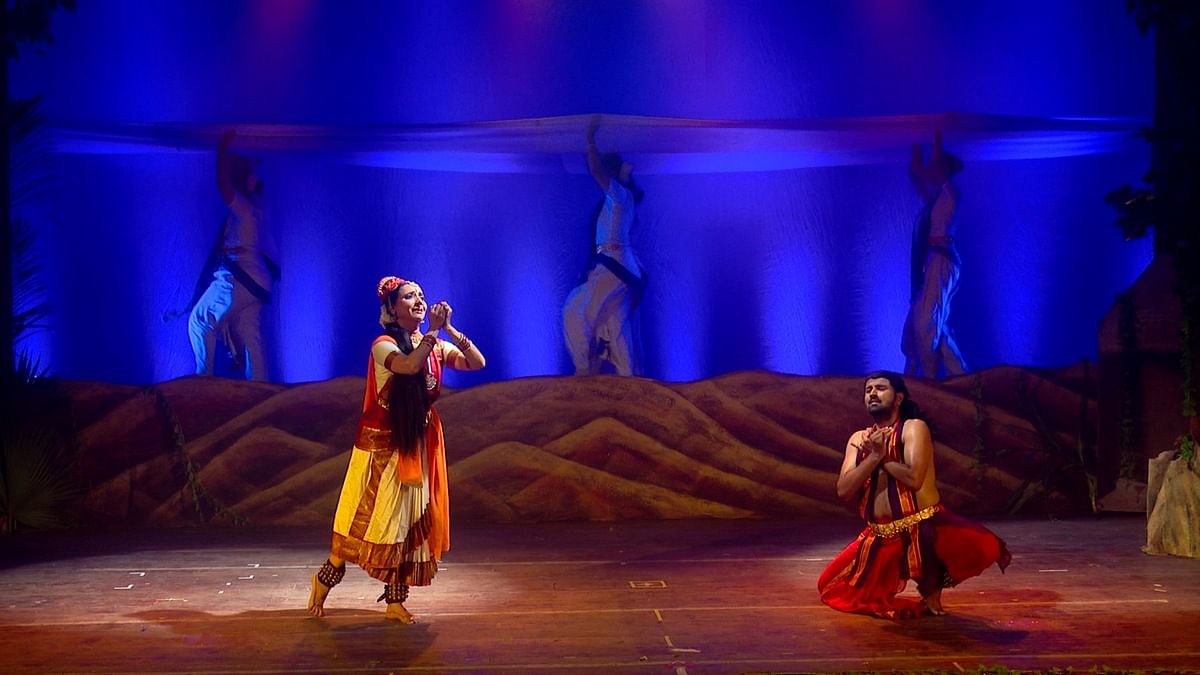SOURCE: THE PRINT
‘I speak Sanskrit, do you?’ Gujarat will host its first Sanskrit Literature Festival now
Sanskrit is rediscovering its place in Gujarat. The two-day literature festival will be held in Ahmedabad to make the language more accessible.
An earlier performance of the Sanskrit Meghdootam | By special arrangement
Sanskrit, often referred to as the mother of all languages, has been the subject of impassioned debate over the last few years. From the fight over its imposition to the political slugfest over the proposal of making it mandatory in schools, most Indian states are now divided over this ancient language. But in Gujarat, Sanskrit is rediscovering its place, with a steady increase in the number of students wanting to learn the language not only for academic purposes but also to understand literature and culture. It is no surprise then, that the state will be home to the first ever Sanskrit Literature festival.
With the message ‘अहं संस्कृतं वदामि, त्वं? (I speak Sanskrit, do you?)’, scholars, poets, students and artistes from different parts of Gujarat will converge in Ahmedabad on 27 August. “We want to make people aware of the resources available to learn Sanskrit, across age groups and societies. This is a platform for us to bring anyone who is curious about Sanskrit, aware of its potential and beauty,” says Dr Mihir Upadhyaya, director of Eklavya Sanskrit Academy, which is one of the three organisers.
Learning Sanskrit, the tech way
Sanskrit has found many takers in Gujarat lately, some want to learn it to study Indian culture, some to have a deeper understanding of literature, and others who take it up as a hobby. Janvi Vadher, 33-year-old chartered accountant, believes people view Sanskrit with a religious tag but a lot of its texts are not.
“Sanskrit is vast, there are so many layers to it and, in a way, it’s a window to learning many languages. I started learning the language six years ago and haven’t stopped,” she says. At the festival, Janvi will be elaborating on the technological resources for learning Sanskrit. “It’s hard to find teachers for Sanskrit despite the language gaining popularity, but there are many resources available online. A lot of work is being done to digitise old manuscripts, Sanskrit texts, and literature now. There are optical character reading apps, special online keyboards.”
Sanskrit now in movies
The literature festival will focus on the spoken word and theatre too.
“It’s not about learning the language, it’s about the way you learn it, and how fluently you can communicate in it. Language is for communication. We have two plays, one on Kalidasa’s Meghdootam and the other on Adi Shankracharya’s life. Meghdootam will have Gujrati translation for those who do not understand Sanskrit. This is an effort to make Sanskrit more engaging,” says Neha Krishna Kumar, a visiting instructor at the CEPT University in Ahmedabad.
With this as the underlying message, the two-day festival will also have separate sessions for children and a discussion on the Sanskrit influence in the entertainment industry.
“Sanskrit has been influencing movies and music for a long time but now the stereotype is being broken, it is being viewed beyond the religious lens. Films like Baahubali and RRR have recreated Sanskrit songs that became quite popular. Films like Brahmastra and OTT shows like Asur have drawn inspiration from Sanskrit literature and are rife with terminologies,” says researcher and writer Nandini Rawal. Through art, technology, movies and movies – Sanskrit is finding a new lease of life. And while the debate over it rages on, the ancient language has found many takers in the state.

.jpg)
